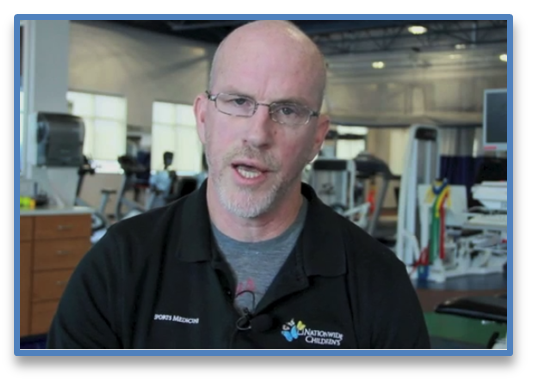Compare to baseline
The sideline-dropstick test may be administered on the sideline, though in our experience, we will commonly take the potentially concussed athlete to the training room to perform testing in a more controlled, less distracting environment than the sideline. We will compare their average performance on 8 drops with their baseline performance. We consider this measure of RT, along with the patient's performance on SCAT3 and BESS testing when determining whether the patient may have sustained a concussion or not. Impairment of RT (a performance worse than baseline) should be considered a potentially significant marker of having sustained a concussion.
Jim MacDonald is a physician specializing in pediatric sports medicine at Nationwide Children's Hospital in Columbus, Ohio and Clinical Assistant Professor of Pediatrics and Family Medicine at the Ohio State University's School of Medicine and Nationwide. An Associate Editor of the Clinical
Journal of Sport Medicine, MacDonald is a Fellow of the American College of
Sports Medicine, and is a member of  MomsTEAM Institute's Board of Advisors.
He earned both his Bachelor's and Medical degrees from Harvard University, and his Masters in Public Health from The Ohio State University. He did his pediatric sports medicine training at Boston Children's Hospital and was previously Team Physician at the University of California, Santa Cruz before coming to Columbus.
MomsTEAM Institute's Board of Advisors.
He earned both his Bachelor's and Medical degrees from Harvard University, and his Masters in Public Health from The Ohio State University. He did his pediatric sports medicine training at Boston Children's Hospital and was previously Team Physician at the University of California, Santa Cruz before coming to Columbus.
As a clinical researcher Dr. MacDonald has received grant funding from the American Medical Society for Sports Medicine (AMSSM) and Nationwide Children's Hospital (NCH). He has experience leading multidisciplinary teams in a variety of research projects investigating the diagnosis and management of pediatric sport-related concussions and in the use of patient-reported outcome measures (PROMs) in the evaluation of pediatric musculoskeletal injuries. His publications and interests also include work on Exercise-Deficit Dysfunction (EDD) in children, a precursor to childhood obesity. Jim is the married father of ten-year old sports-active twins, a boy and a girl.
Footnotes:
1. McClincy MP, Lovell MR, et al. Recovery from Sports Concussion in High School and Collegiate Athletes. Brain Inj 2006;20(1):33-39.
2. Covassin T, Harris W, et al. The Role of Age and Sex in Symptoms, Neurocognitive Performance, and Postural Stability in Athletes after Concussion. Am J Sports Med. 2012;40(6):1303-1312.
3. Covassin T, Elbin RJ, Nakayama Y. Tracking Neurocognitive Performance Following Concussion in High School Athletes. Phys Sportsmed. 2010;38(4):87-93.
4. Warden DL, Bleiberg J, Cameron KL, et al. Persistent Prolongation of Reaction Time in Sports Concussion. Neurology 2001;57(3):524 - 526.
5. Lau B, Lowell MR, Collins MW et al. Neurocognitive and Symptom Predictors of Recovery in High School Athletes. Clin J Sport Med 2009;19:216-221.
6. Eckner JT, Lipps DB, et al. Can a Clinical Test of Reaction Time Predict a Functional Head-Protective Response? Med Sci Sports Exerc. 2011;43(3):382-387.
7. MacDonald J, Duerson D. Reliability of a Computerized Neurocognitive Test in Baseline Concussion Testing of High School Athletes. Clin J Sport Med 2014;24:e34 - e35.
8. Eckner JT, Kutcher JS, Richardson JK. Pilot Evaluation of a Novel Clinical Test of Reaction Time in National Collegiate Athletic Association Division I Football Players. J Athl Tr. 2010;45(4):327-332.
9. Eckner JT, Kutcher JS, Richardson JK. Effect of Concussion on Clinically Measured Reaction Time in 9 NCAA Division I Collegiate Athletes: a Preliminary Study. PMR 2011;3:212-218.
10. Eckner JT, Whitacre RD, et al. Evaluating a Clinical Measure of Reaction Time: an Observational Study. Percept Motor Skills 2009; 108: 717-720.
11. Eckner JT, Kutcher JS, Richardson, JK. Between-Seasons Test-Retest Reliability of Clinically Measured Reaction Time in National Collegiate Athletic Association Division I Athletes. J Athl Tr. 2011;46(4):409-414.
12. Eckner JT, Chandran S, Richardson JK. Investigating the Role of Feedback and Motivation in Clinical Reaction Time Assessment. PMR 2011;3:1092-1097.
13. Richardson JK, Eckner JT, et al. A Clinical Measure of Reaction Time is Sensitive to Sport-Related Concussion. Clin J Sport Med 2012;22(2):172.
14. MacDonald J, Wilson J, Young J, et al. Evaluation of a Simple Test of Reaction Time for Baseline Concussion Testing in a Population of High School Athletes. Clin J Sport Med. 2014 (http://www.unboundmedicine.com/medline/citation/24727576/Evaluation_of_a...
15, Eckner JT, Kutcher JS, Broglio SP, Richardson JK. Effect of sport-related concussion on clinically measured simple reaction time. Br J Sports Med. 2014;48(2):112-118 doi:10.1136/bjsports-2012-091579








